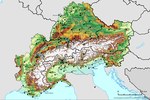News
What now for the Alpine strategy?
Today, February 7th 2018, the federal state of Tyrol is inviting participants to the kick-off event in the Austrian city of Innsbruck to mark the beginning of a decisive year. The European Strategy for the Alpine Region (Eusalp) was unveiled two years ago and today, following Slovenia and Bavaria, Tyrol will be the third state to take over the presidency. Yet many questions remain unanswered. Last year above all saw the various stakeholders coming together and familiarising themselves with the processes. This year will show how the Alpine strategy is to be implemented.
Mobility, education and the labour market, natural resources, natural hazards, energy: Tyrol has set out its substantive priorities for Eusalp, with a particular focus on traffic, notably the transfer of freight from road to rail. Transalpine freight traffic on the autobahn over the Brenner Pass has significant effects on this part of Austria, but the interests involved are controversial.
Andreas Pichler, director of CIPRA International, stresses that: «Eusalp reflects different interests that are not always compatible. Compromise is vital.» He fears that the proponents of short-term growth will prevail, a point that CIPRA drew attention to with its open letter in autumn of 2017.
Society – especially young people – should represent the foundation of a democratically based, active strategy. With the involvement of young people in its 2017 annual forum, the Eusalp consortium has now made a first step towards such participation.
In 2018, in addition to Eusalp, Austria is also chairing the Alpine Convention and will take over the EU presidency for the second half of the year. Direct ways do not however automatically lead to more co-operation, observes Peter Hasslacher, President of CIPRA Austria: «So far, we have not seen any co-ordinating activities. The implementation of the protocol concerning nature protection and landscape conservation is still awaiting ratification by the EU, for example.»
Sources and further information:
www.tirol.gv.at/tirol-europa/eu-alpenstrategie/ (de), www.cipra.org/de/positionen/offener-brief-eusalp-generalversammlung-im-november-2017 (de, fr, it, sl), www.tt.com/politik/landespolitik/13540083-91/tirol-will-lkw-kollaps-in-alpen-verhindern.csp (de), www.alpine-region.eu, www.alpconv.org/en/convention/protocols/Documents/protokoll_naturschutzGB.pdf





